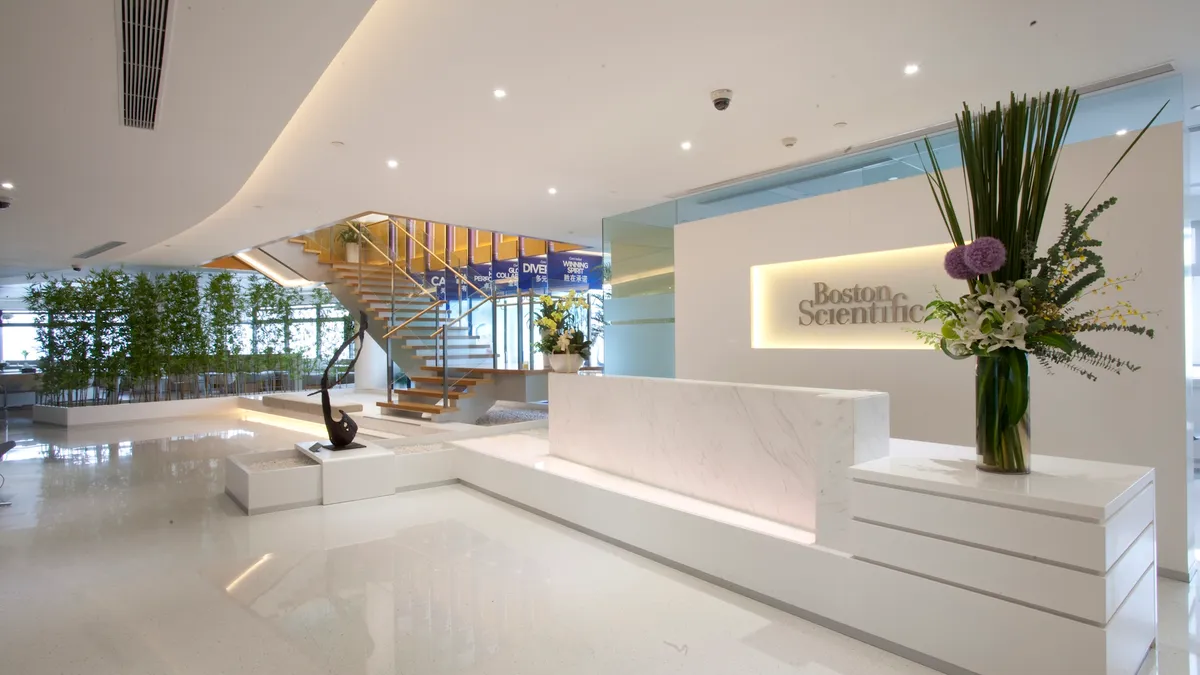Dive Brief:
- Boston Scientific reported fourth-quarter sales decreases that were in line with results preannounced by the company during the J.P. Morgan healthcare conference in January. The overall sales declines of 7.7% and declines across multiple segments missed Wall Street expectations.
- CEO Mike Mahoney attributed the hit in the quarter to a slowdown for elective procedures in November and December after seeing a rebound through October. The CEO expects the first quarter to largely replicate the closure of last year with a gradual increase in the second quarter and a return to normal levels in the second half.
- Wall Street analysts said that they were not surprised by Boston Scientific's performance despite the quarter missing expectations and 2021 guidance being conservative. Investors seemed to respond similarly as the company's stock price was trading up by over 2% Wednesday morning.
Dive Insight:
The slowdown in electives at the end of 2020 has been felt across the medtech industry, with Johnson & Johnson, Abbott Laboratories and Stryker all reporting a drop off in procedures after levels were steadily growing through the second and third quarters.
Boston Scientific's sales drop was fueled by an 11.2% year-over-year decline for neuromodulation and a 21.9% decline for interventional cardiology. The company's cardiovascular and medical device businesses also declined by 12% and 6.1%, respectively.
J.P. Morgan analysts wrote that the company missed their expectations for neuromodulation by $29 million and interventional cardiology by $47 million.
Sales were down operationally 9% in the U.S. and emerging markets, with a 7% decline in China, according to Mahoney. A 6% sales decline was also taken in Europe, the Middle East and Africa.
The switch to a consignment inventory model for the Watchman left atrial appendage closure device contributed to a decline in the quarter, and discontinuing the Lotus Edge transcatheter aortic valve replacement system cost the company about $15 million.
Overall, sales declined by 7.7% from $10.7 billion in 2019 to $9.9 billion in 2020.
SVB Leerink analysts wrote that the fourth-quarter performance and 2021 guidance is not "in any way thesis-changing" because "the company has the most compelling product portfolio in largecap MedTech levered to some of the highest-growth markets."
However, the analysts were cautious on success for Boston Scientific in the near term, highlighting challenges like elective procedure dependence, continue transition challenges for Watchman and a step back from the hot TAVR market.
Mahoney expects the declines in elective care to continue throughout the first quarter, providing a guidance range for organic revenue between minus 6% and no growth compared to 2019 levels in the quarter. For the full year, Boston Scientific expects organic sales growth to range between 12% and 18% compared to 2020 but a range between no growth and 5% compared to 2019.
"We're seeing some impact in the first quarter, and we think that's going to diminish quite a bit in second quarter as vaccines roll out and patient demand increases, and we expect a very healthy second half of the year," Mahoney said.
The CEO also predicted a "sharp recovery" in deferred procedures as vaccine administration ramps up. While Mahoney expects a comeback to vary across different countries, he said that sales in China should grow by "strong" double digits.
Guidance for 2021 did not include contributions from the company's recent acquisition of Preventice Solutions. Boston Scientific announced the $925 million buy in January, positioning the company in the fast-growing cardiac wearables market.
Analysts have been optimistic about the market, particularly the extended holter submarket, and there has recently been a run of cardiac wearable acquisitions over the last two months. However, the market faces some uncertainty after a regional Medicare Administrative Contractor (MAC) dropped rates for extended external EKG use.
Novitas Solutions posted rates that ranged between $40-$80 for a jurisdiction that includes Texas, Mississippi and Louisiana. For comparison, market leader iRhythm Technologies' previous reimbursement rate was $311, according to William Blair analysts. iRhythm's stock price sank by over 32% when the market closed Friday.
The setback came after CMS did not propose to set a national pricing rate in December, kicking the decision to the MACs.
Mahoney said that the reimbursement situation with Novitas remains "fluid" and expects a possible change after further meetings. He said even with the lowered rates, Preventice would still be a positive because the company also has short-term use offerings, which saw a slight increase in reimbursement rates.
However, Mahoney acknowledged long-term use is a fast-growing market and makes up 10-15% of Preventice's sales.
While final rates could be renegotiated up, analysts are still unsure if they would match previous levels.












